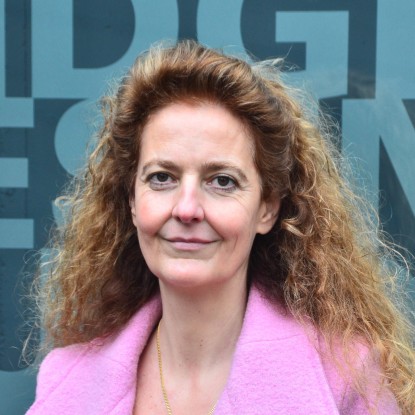42nd Solid Construction Seminar
Exciting impressions from the 42nd Darmstadt Solid Construction Seminar – Paths to Sustainable Solid Construction
2024/10/15
How can solid construction in Germany become more environmentally and climate-friendly? This question was addressed last Wednesday and Thursday at the 42nd Solid Construction Seminar at TU Darmstadt. The two-day event, led by Prof. Danièle Waldmann-Diederich, was held under the theme 'Paths to Sustainable Solid Construction' and took place in the Wilhelm-Köhler Hall of the old main building of TU Darmstadt.
The pre-event on October 9, 2024, will open with an introduction by Prof. Waldmann-Diederich and a greeting from Mr. Thomas Mathias Reimann of the Hessian Construction Industry, followed by an exciting keynote lecture by Prof. Manfred Curbach (Institute for Solid Construction, TU Dresden, and LAB Living Art of Building). He will compellingly demonstrate that a radical shift in construction practices is NOW required to achieve climate goals and protect the planet from even worse disasters – it’s 90 seconds before 12. He emphasizes that there isn’t just one solution, but rather a multitude of solutions needed to lead the construction sector towards climate neutrality. Following the keynote, an engaging panel discussion will take place with Prof. Curbach, Dr. Christian Hey (Hessian Ministry), Dr. Katja Hüske (DB InfraGO AG), Prof. Christoph Müller (VDZ Technology gGmbH), Thomas Mathias Reimann (Hessian Association of Construction Entrepreneurs), and Thomas Zawalski (solid UNIT e.V.), where the key challenges on the path to sustainable solid construction will be discussed. It will be highlighted that many solutions and promising approaches already exist. However, there is still a huge need for research to develop these solutions to practical application in construction. A further major challenge noted by the panel participants is that the use of sustainable solutions often requires higher financial investments from companies and builders.
At a subsequent, convivial dinner at the nearby Welcome Hotel, the lively discussions will continue over delicious food and refreshing drinks, with plenty of interaction and exchange among the participants.
On Thursday morning, the day seminar, divided into four thematic blocks, will begin. It is based on the sustainable circular model of the Institute for Solid Structures:
In the first of four lecture blocks, the block on Sustainable Building Materials, Prof. Christoph Müller (VDZ Technology gGmbH) and Fulvio Canonico (Wilhelm Dyckerhoff Institute) addressed the question of how the building material concrete can achieve climate neutrality. They demonstrated to the audience the role new binders, cement-reduced concretes, and CO2 capture and storage can play in this process. Prof. Müller focused on the perspective of the cement industry as a whole, while Canonico discussed the practical implementation of various solution approaches from the perspective of businesses. Both speakers impressively presented the current industrial capabilities and future prospects of cement and concrete production.
After a lively coffee break, the second lecture block, Sustainable Building Design, focused on how we can design new buildings to be circular from the very early design phase. In three presentations, various solution approaches for solid construction were introduced: Prof. Danièle Waldmann-Diederich (Institute for Solid Structures, TU Darmstadt) presented the potential of a demountable timber-concrete composite floor system, Dr. Kati Herzog (GOLDBECK) outlined various sustainability strategies in precast concrete construction, and Prof. Alexander Schumann (CARBOCON GMBH) presented current findings and practical projects for structures made of carbon concrete, as well as for existing buildings reinforced with carbon concrete.
After a communicative lunch break with a delicious buffet in the foyer of the Wilhelm-Köhler Hall, the program continued with the third lecture block, 'Monitoring over the Lifecycle.' Prof. Alfred Strauss (University of BoKu Vienna) presented how damage to a large number of bridges in need of renovation can be detected and assessed to maximize the lifespan of existing structures while reliably estimating their condition. The subsequent lecture by Mr. Frank Plöger (HOCHBAHN U5 Project GmbH) focused on optimizing energy and material flows for the large-scale infrastructure project of the new U5 subway line in Hamburg. He demonstrated how comprehensive accounting and optimization during the planning phase can significantly reduce CO2 emissions and save resources. The third lecture in this block, by Johanna Theilmann (DB InfraGO AG), illustrated the approaches of DB InfraGo on the path to a climate-neutral railway project.
After another coffee break with lively exchanges among the participants, the seminar focused on the final topic block, 'Reuse and Recycling.' Michael Scharpf (Holcim Germany) presented current data on the recycling of concrete and cement, emphasizing that, in comparison to Switzerland, there is still significant potential in Germany to increase the recycling share in concrete. The final lecture, by Angelika Mettke (BTU Cottbus), impressively demonstrated the possibility of reusing entire concrete elements in new buildings, based on a variety of projects she had conducted. Ms. Mettke highlighted that while this climate-friendly construction method has great potential, a lack of guidelines leads to very high implementation costs and efforts. Nonetheless, the method itself carries enormous potential for a sustainable construction revolution.
After these two days filled with inspiring solution approaches, the participants were presented with several promising paths to sustainable solid construction. However, it also became clear that the journey ahead is still a long one.
We would like to thank the speakers for their excellent presentations and all the participants for the lively and engaged exchange. We are already looking forward to our next Darmstadt Solid Construction Seminar.






